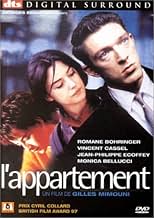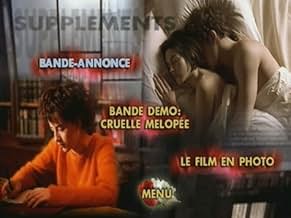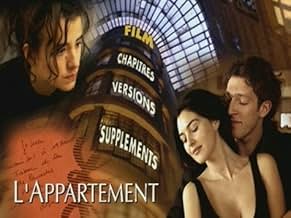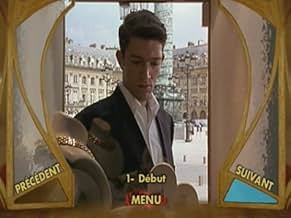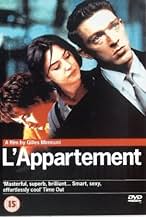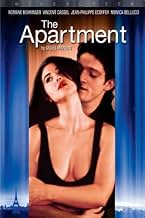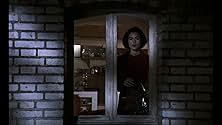ÉVALUATION IMDb
7,3/10
17 k
MA NOTE
Un homme tout récemment fiancé rencontre une ancienne amante et ne pense plus qu'à la revoir.Un homme tout récemment fiancé rencontre une ancienne amante et ne pense plus qu'à la revoir.Un homme tout récemment fiancé rencontre une ancienne amante et ne pense plus qu'à la revoir.
- A remporté le prix 1 BAFTA Award
- 2 victoires et 3 nominations au total
Avis en vedette
After two years working in New York in the 90's, the successful executive Max Mayer (Vincent Cassel) returns to Paris and will sooner get married to his fiancée Muriel (Sandrine Kiberlain). He has a meeting in a restaurant with Japanese executives and then he will travel to Tokyo. However, he glances at a woman leaving a telephone booth and he believes she is Lisa (Monica Bellucci), the greatest love of his life who had disappeared years ago. He finds the key of a Parisian hotel room in the booth and he calls off his trip to Tokyo trying to meet Lisa in the hotel. He sneaks into the empty room; finds an obituary and goes to the cemetery expecting to find Lisa. Then he follows the stranger Daniel (Olivier Granier), whose name he had overheard in the booth cabin, and finds an apartment that he supposes is Lisa address. Meanwhile Max recalls his romance with Lisa in flashbacks. Max borrows the car of his best friend Lucien (Jean-Philippe Écoffey), who is in love with his girlfriend Alice, to go to the apartment wait for Lisa. However, he finds another woman also called Lisa (Romane Bohringer). The mystery is clarified through the flashbacks.
"L'Appartement" is an intriguing thriller about missing encounters, obsession and serendipities with a disappointing and incoherent conclusion. The non-linear screenplay keeps the mystery until the very end. The performances of Vincent Cassel, Monica Bellucci and Jean- Philippe Écoffey are excellent, but the sexy Romane Bohringer steals the movie in the role of an outcast woman obsessed by her only girlfriend. Unfortunately there are many flaws and holes in the story.
The first one is indeed a continuity mistake, with Max's scarf vanishing when meets Lucien in the stairway and in the restaurant, but back around his neck when he goes to the airport.
There are questions not answered: Why Lisa had lodged in a hotel in Paris if she has her own apartment? How Alice financially supports herself? Why Max stays with Muriel in the end? Why Lisa trusted on a single letter, instead of looking for Lucien and asking Max's address in New York and send an ultimate letter?
My interpretation of the plot is that the lonely and needy Alice is obsessed by Lisa and creates all the missing encounters to avoid Lisa to meet Max and leave her alone again. But in the end, she finds that Max desires and loves her and she unexpectedly falls in love with Max. Therefore, she does not need Lisa anymore. However, my interpretation seems to be wrong based on the reaction of Max after reading her diary. But again, Alice is a manipulative woman and the viewer never knows neither what is written in her journal (maybe the real feelings of the true Lisa) nor her conversation without audio with Lisa. Further, Max is a romantic man that has never acknowledged the love of Lisa with him and believe his feelings are unrequited love.
There are references to "Rear Window" and "Single White Female", but nevertheless, the terrible conclusion does not make any sense. My vote is seven.
Title (Brazil): "O Apartamento" ("The Apartment")
"L'Appartement" is an intriguing thriller about missing encounters, obsession and serendipities with a disappointing and incoherent conclusion. The non-linear screenplay keeps the mystery until the very end. The performances of Vincent Cassel, Monica Bellucci and Jean- Philippe Écoffey are excellent, but the sexy Romane Bohringer steals the movie in the role of an outcast woman obsessed by her only girlfriend. Unfortunately there are many flaws and holes in the story.
The first one is indeed a continuity mistake, with Max's scarf vanishing when meets Lucien in the stairway and in the restaurant, but back around his neck when he goes to the airport.
There are questions not answered: Why Lisa had lodged in a hotel in Paris if she has her own apartment? How Alice financially supports herself? Why Max stays with Muriel in the end? Why Lisa trusted on a single letter, instead of looking for Lucien and asking Max's address in New York and send an ultimate letter?
My interpretation of the plot is that the lonely and needy Alice is obsessed by Lisa and creates all the missing encounters to avoid Lisa to meet Max and leave her alone again. But in the end, she finds that Max desires and loves her and she unexpectedly falls in love with Max. Therefore, she does not need Lisa anymore. However, my interpretation seems to be wrong based on the reaction of Max after reading her diary. But again, Alice is a manipulative woman and the viewer never knows neither what is written in her journal (maybe the real feelings of the true Lisa) nor her conversation without audio with Lisa. Further, Max is a romantic man that has never acknowledged the love of Lisa with him and believe his feelings are unrequited love.
There are references to "Rear Window" and "Single White Female", but nevertheless, the terrible conclusion does not make any sense. My vote is seven.
Title (Brazil): "O Apartamento" ("The Apartment")
I saw this movie in Korea back in 1999, and it lingered in my mind for a while after viewing. It was also my introduction to the hauntingly beautiful Monica Bellucci (HER face could launch a thousand ships).
The twists and turns and bizarre ending makes this a must see. I hope they release an uncut DVD version as I own the Korean release that had three minutes cut out.
Highly recommended and a film you can see more than once!
The twists and turns and bizarre ending makes this a must see. I hope they release an uncut DVD version as I own the Korean release that had three minutes cut out.
Highly recommended and a film you can see more than once!
A wonderful story about the consequences of obsessive love with the beautiful romantic back streets of Paris as its location. We're transported through time and see the plot develop from the perspectives of the three main characters as the mystery unwinds.
A very confusing film with nods to Hitchcock, some very good photography and little else. The plot involves the Hitchcock staples of obsession and paranoia but lacks the ultimate touch of the master - suspense. I was told that this film was a 'must see' and how great it was and how wonderful the structure was and how engaging it all was. Well, do not waste the time because this film is a pretentious, overlong piece of French 'style' - lots of visual cleverness and moody pouting (called great acting when it is in a French film) but little substance. At the end you could not care less what happens to these self-obsessed characters and I must have had a bad day because I could not follow a lot of this. The film uses a fragmented narrative by presenting the sequences in flashback and in no particular order. We are shown scenes several times and with new perspectives each time so we can try to make sense of the story, if one can call it that. I had to resort to looking at the characters' hair in order to figure out when things were happening. There was also a great deal of symbolism - red rose, white rose, red walls, white shirts, long hair, short hair, red shoes and on and on and on until I yelled enough! The symbols, of course, go nowhere and are presented in sledgehammer fashion so that we can marvel at how clever it all is even though it makes no sense. This is "Single White Female" meets French pretension made by a director who has studied too many Hitchcock films but failed the exam.
Stylish, erotic and complex, Gilles Mimouni's only film to date appears at first sight to be quintessentially French, but has links to American identity-themed, noirish thrillers, such as Preminger's Laura and Hitchcock's Vertigo. (I'm also not so sure as other postings that all the locations and interiors are actually Parisian; the credits indicate that a lot of the movie was made in Spain.)
Max (Vincent Cassel) is a successful, young executive, engaged to be married, who catches a fleeting glimpse of an ex-lover, Lisa (Monica Bellucci), and immediately drops plans to travel to Tokyo, in order to find her. But, instead, he finds another woman (Romane Bohringer), bearing a resemblance to Lisa, with whom he starts an affair, while still hoping to find Lisa.
The story is told in an extremely fragmented manner, jumping backwards and forwards in time, with hair-style, clothing and sometimes weather providing clues to the sequence of events. By the end of the film almost every i has been dotted, and t crossed, so that theoretically it should be possible to re-edit the movie so that it is linear. But as well as being a duller movie, this would lose what I see as one of its main themes - that memories, fuelled by imagination, can be more powerful than mundane reality. Another theme seems to be that not everybody gets what they deserve, and life can be cruel. Generally, I see the film as being bleaker and more amoral than do some IMDb postings.
The acting, camerawork, sets, music and, of course, the editing are all first rate. This is a perfect film to rent, so that baffling bits (or all) of it can be replayed.
Max (Vincent Cassel) is a successful, young executive, engaged to be married, who catches a fleeting glimpse of an ex-lover, Lisa (Monica Bellucci), and immediately drops plans to travel to Tokyo, in order to find her. But, instead, he finds another woman (Romane Bohringer), bearing a resemblance to Lisa, with whom he starts an affair, while still hoping to find Lisa.
The story is told in an extremely fragmented manner, jumping backwards and forwards in time, with hair-style, clothing and sometimes weather providing clues to the sequence of events. By the end of the film almost every i has been dotted, and t crossed, so that theoretically it should be possible to re-edit the movie so that it is linear. But as well as being a duller movie, this would lose what I see as one of its main themes - that memories, fuelled by imagination, can be more powerful than mundane reality. Another theme seems to be that not everybody gets what they deserve, and life can be cruel. Generally, I see the film as being bleaker and more amoral than do some IMDb postings.
The acting, camerawork, sets, music and, of course, the editing are all first rate. This is a perfect film to rent, so that baffling bits (or all) of it can be replayed.
Le saviez-vous
- AnecdotesThe play that features Lisa and Alice is 'A Midsummer's Night Dream' by William Shakespeare.
- ConnexionsFeatured in The Movie Show: Episode dated 12 February 1997 (1997)
- Bandes originalesSame kind of woman
Words and Music by Peter Chase
Meilleurs choix
Connectez-vous pour évaluer et surveiller les recommandations personnalisées
- How long is The Apartment?Propulsé par Alexa
Détails
- Date de sortie
- Pays d’origine
- Langues
- Aussi connu sous le nom de
- The Apartment
- Lieux de tournage
- Rue de Furstemberg, Paris 6, Paris, France(rendez-vous location for Max and Lisa)
- sociétés de production
- Consultez plus de crédits d'entreprise sur IMDbPro
- Durée1 heure 56 minutes
- Couleur
- Mixage
- Rapport de forme
- 1.66 : 1
Contribuer à cette page
Suggérer une modification ou ajouter du contenu manquant



